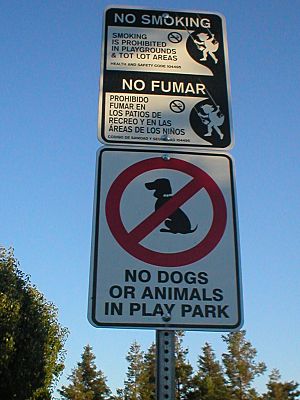Social control facts for kids
Social control is about the ways societies guide people's thoughts, feelings, how they look, and how they act. It helps keep things organized and makes sure people follow the rules.
Contents
What is Social Control?
Social control means all the ways a group or community tries to make its members follow certain rules and expectations. It helps keep order and peace. Without it, things might get chaotic.
Why Do We Need Social Control?
Imagine a game without rules. It would be hard to play, right? Society is similar. Social control helps everyone know what is expected. It makes sure people act in ways that benefit the group. This helps keep everyone safe and happy.
Keeping Society Running Smoothly
Social control helps society work well. It teaches us how to behave in different places. For example, we learn to be quiet in a library. We learn to wait our turn in a line. These small rules make daily life easier for everyone.
Protecting People and Property
One big reason for social control is safety. Rules against stealing or hurting others protect people. Laws are a strong form of social control. They help keep us safe and protect what we own.
How Does Social Control Work?
There are two main types of social control:
- Formal social control
- Informal social control
Formal Social Control: Clear Rules and Laws
Formal social control uses official rules and laws. These are often written down. They are enforced by specific groups.
- Laws: These are rules made by the government. Police and courts make sure people follow them. If you break a law, there are clear consequences.
- School rules: Schools have rules about attendance, behavior, and dress codes. Teachers and principals enforce these.
- Workplace rules: Jobs have rules about how employees should act. These rules help the business run smoothly.
Informal Social Control: Everyday Influence
Informal social control happens in our daily lives. It comes from our families, friends, and communities. It is not written down.
- Family expectations: Your parents might teach you to say "please" and "thank you." They might expect you to help with chores.
- Peer pressure: Your friends might influence how you dress or what music you listen to. This can be a form of social control.
- Social norms: These are unwritten rules about how to act. For example, it is a norm to not talk loudly in a movie theater. If you do, people might give you a look.
Examples of Social Control in Action
Social control is all around us.
- Traffic laws: Speed limits and traffic lights control how people drive. This keeps roads safe.
- School dress codes: These rules guide what students can wear. They aim to create a good learning environment.
- Politeness: Saying "excuse me" when you bump into someone is an informal rule. It shows respect.
- Applause: Clapping after a performance is a way to show approval. It encourages good behavior.
How We Learn Social Control
We learn about social control from a young age.
- Family: Our parents and guardians teach us right from wrong.
- School: Teachers help us understand rules and how to get along with others.
- Media: Books, TV shows, and movies often show us what is considered good or bad behavior.
- Community: Being part of a group helps us learn its customs and expectations.
The Role of Values and Beliefs
Social control is often based on a society's shared values and beliefs.
- Values: These are ideas about what is important or good. For example, many societies value honesty.
- Beliefs: These are things people accept as true. For example, a belief that hard work leads to success.
When people share values and beliefs, it is easier for social control to work.
How Values Shape Rules
If a society values cleanliness, it might have rules about littering. If it values safety, it will have laws about dangerous actions. These shared ideas help create the rules that guide behavior.
See also
 In Spanish: Control social para niños
In Spanish: Control social para niños
 | Roy Wilkins |
 | John Lewis |
 | Linda Carol Brown |


